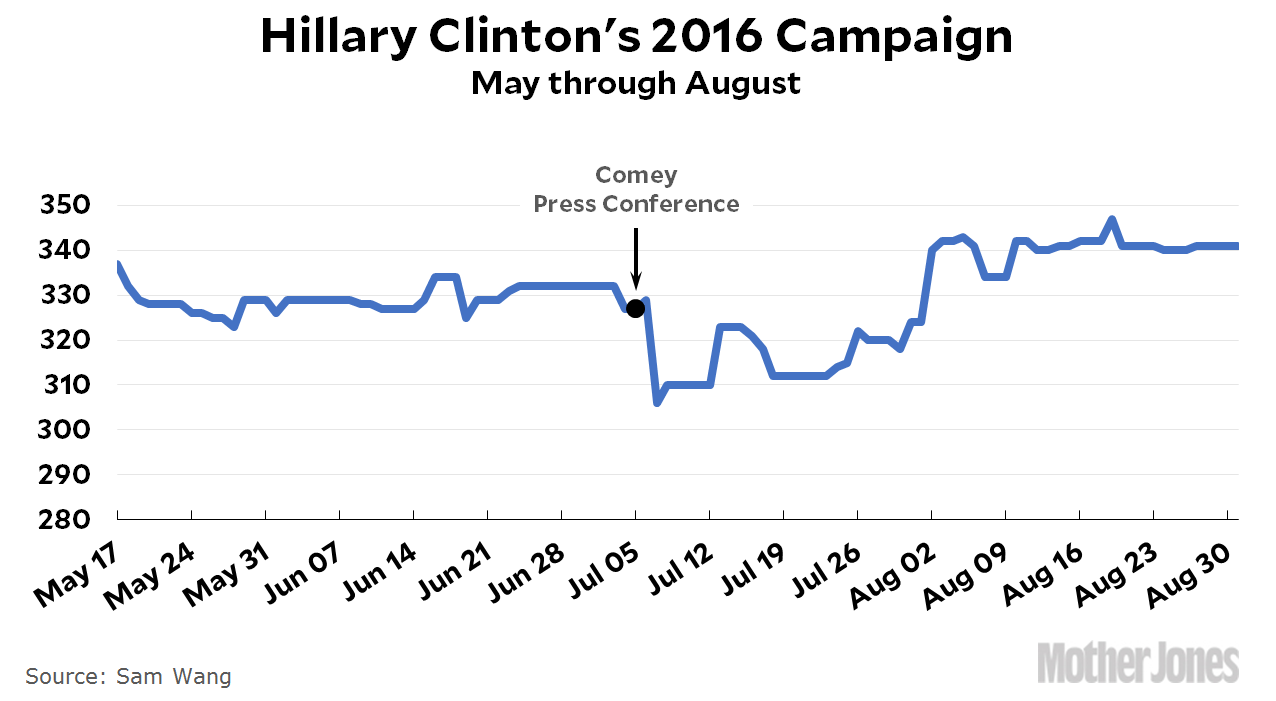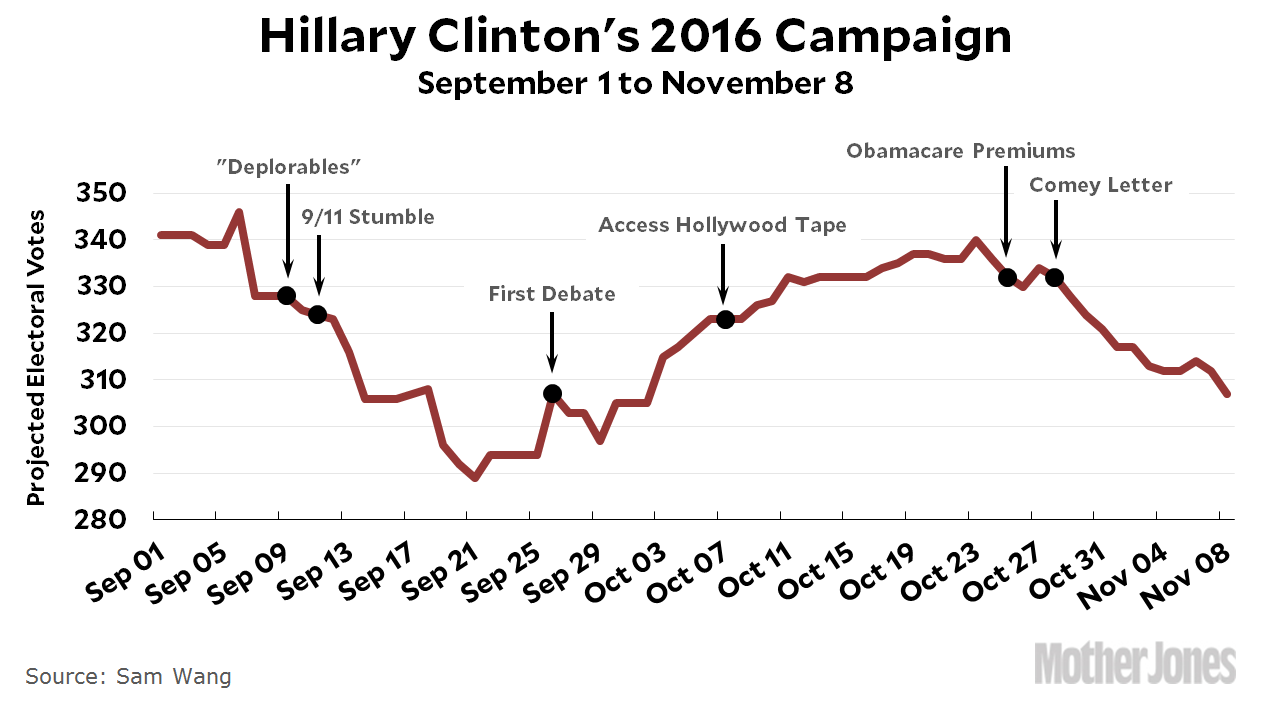I have frequently made the case that Donald Trump is president because of FBI director James Comey. On October 28, Comey wrote a letter to Congress telling them that the FBI was investigating a new cache of Clinton emails that it found on the laptop of Huma Abedin’s estranged husband, Anthony Weiner. That was the turning point. Clinton’s electoral fortunes went downhill from there and never recovered.
As shocking as this may sound, not everyone agrees with me. A new book, Shattered, makes the case that Clinton was an epically bad candidate and her campaign was epically badly run. That’s why she lost. Yesterday, Shadi Hamid took aim at me for my continued Comey obsession in the face of the story told in Shattered:
Sad to watch smart, liberal writers, like @kdrum, refuse to engage in introspection, instead blaming HRC’s loss on Comey, Russia, squirrels
— Shadi Hamid (@shadihamid) April 21, 2017
I’m citing @kdrum b/c I loved his blog. But then he descended into self-parody. His position—no hyperbole—is that it’s all b/c of Comey pic.twitter.com/a2VYVvAfij
— Shadi Hamid (@shadihamid) April 21, 2017
Let’s talk. There’s a reason I blame Comey, and it’s not because I live in a bubble. It’s because a massive amount of evidence points that way. Today I want to put the whole case in one l-o-o-o-o-ng post so everyone understands why I think Comey was the deciding factor in the election. If you still disagree, that’s fine, but this is the evidence you need to argue with.
NOTE: I want to make clear that I’m talking solely about Hillary Clinton and the presidency here. Democrats have been badly pummeled at the state level over the past six years, and that obviously has nothing to do with Comey. It’s something that Democrats need to do some soul searching about.
Ready? Let’s start with some throat-clearing.
First: Keep in mind that Clinton was running for a third Democratic term during a period when (a) the economy was OK but not great and (b) Barack Obama’s popularity was OK but not great. Models based on fundamentals therefore rated the election as something of a tossup. Clinton was not running as a sure winner.
Second: For the sake of argument, let’s assume that Hillary Clinton was an epically bad, unpopular candidate who ran a terrible campaign. She foolishly used a private email server while she was Secretary of State. She gave millions of dollars in speeches after leaving the State Department. She was a boring speaker with a mushy agenda. She was a hawkish Wall Street shill who failed to appeal to millennials. She lost the support of the white working class. Her campaign was a cespool of ego, power-mongering, and bad strategy. Let’s just assume all that.
If this is true, it was true for the entire year. Maybe longer. And yet, despite this epic horribleness, Clinton held a solid, steady lead over Trump the entire time. The only exception was a brief dip in July when Comey held his first presser to call Clinton “extremely careless” in her handling of emails. Whatever else you can say about Hillary Clinton, everyone knew about her speeches and her emails and her centrism and everything else all along. And yet, the public still preferred her by a steady 3-7 percentage points over Trump for the entire year.
Third: Every campaign has problems. If you win, they get swept under the rug. If you lose, bitter staffers bend the ears of anyone who will listen about the campaign’s unprecedented dysfunction and poor strategy. This is all normal. Both the Clinton and Trump campaigns had all the usual problems, and in a close election you can blame any of them for a loss. But two things set the Comey letter apart. First, it had a big effect right at the end of the race. Second, it was decidedly not a normal thing. It came out of the blue for no good reason from the chief law enforcement officer of the United States. There is nothing Clinton could have done about it.
With that out of the way, let’s take a look at the Clinton campaign. All of the poll estimates look similar, but I’m going to use Sam Wang’s EV estimator because it gives a pretty sharp day-to-day look at the race. (Wang’s final estimate was wrong, of course, like pretty much everyone else’s, but don’t worry about that. What we’re interested in is the ups and downs.) First off, here are his daily estimates through the end of August:

With the brief exception of the July Comey presser, the race was amazingly stable. During the entire year, Clinton has a formidable lead that translates into 330-340 electoral votes. Now let’s pick up the story in September:

At the beginning of September, Clinton slumps following her “deplorables” comment and her stumble at the 9/11 memorial. After Trump’s shockingly bad performance at the first debate she starts to regain ground, and continues to gain ground when the Access Hollywood tape is released. By the end of October she’s back to where she started, with a big lead over Trump. THIS IS IMPORTANT: despite everything — weak fundamentals, the “deplorables” comment, her personal unpopularity, her mushy centrism, her allegedly terrible campaign — by the end of October she’s well ahead of Trump, just as she had been all year. It’s clear that 330-340 electoral votes is her baseline level of support.
On October 25, HHS announces that Obamacare premiums will go up substantially in the following year. This doesn’t appear to have any effect. Then, on October 28, Comey releases his letter. Clinton’s support plummets immediately, and there’s no time for it to recover. On November 8, Trump is elected president.
But how much did Comey’s letter cost Clinton? Let’s review the voluminous evidence:
- Nate Silver estimates the Comey letter cost Clinton about 3 points.
- A panel survey from the Institute for the Study of Citizens and Politics suggests the Comey letter produced a net swing of 4 points toward Trump.
- Sam Wang estimates the Comey letter cost Clinton 4 points, though she may have made back some of that in the final days.
- Engagement Labs tracks “what people are talking about.” Immediately after the Comey letter, they registered a 17-point drop in favorable sentiment toward Clinton.
- Google searches for “Hillary’s email” spiked 300 percent after Comey’s letter.
- The tone of news coverage flipped enormously against Clinton after the Comey letter.
- A trio of researchers who looked at the evidence concluded that Comey’s letter was decisive, probably costing Clinton 3-4 points in the popular vote.
- Trump’s own analysts think the Comey letter was decisive.
- The Clinton campaign agrees that the Comey letter was decisive, and adds that Comey’s second letter hurt her too.1
I’m not sure how much clearer the evidence could be. Basically, Hillary Clinton was doing fine until October 28. Then the Comey letter cost her 2-4 percent of the popular vote. Without Comey she would have won comfortably — possibly by a landslide — even though the fundamentals predicted a close race.
That’s it. That’s the evidence. If you disagree that Comey was decisive, you need to account for two things. First, if the problem was something intrinsic to Clinton or her campaign, why was she so far ahead of Trump for the entire race? Second, if Comey wasn’t at fault, what plausibly accounts for Clinton’s huge and sudden change in fortune starting precisely on October 28?
One way or another, it appears that all the things that were under Hillary Clinton’s control were handled fairly well. They produced a steady lead throughout the campaign. The Comey letter exists on an entirely different plane. It was an unprecedented breach of protocol from the FBI; it was completely out of Clinton’s control; and it had a tremendous impact. That’s why I blame James Comey for Donald Trump’s victory.
UPDATE: I’ve added a chart showing Clinton’s level of support from May through August.
1The second letter was the one that cleared her. However, merely by keeping the subject in the news, it hurt Clinton.










